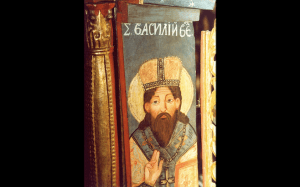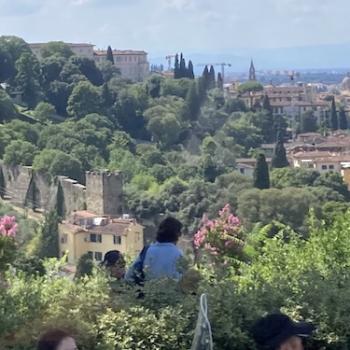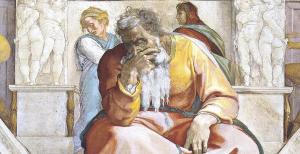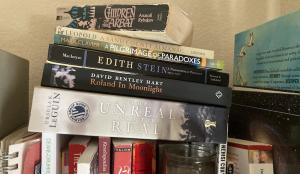
“Everything that partakes of [the Holy Spirit’s] grace is filled with joy according to its capacity.” -Saint Basil the Great
In my little systematic theology, I suggested, oddly, that the grammar of the Christian faith begins with the Spirit. Odd, because it seems more straightforward to start with what is more obviously unique in this particular faith. The cross, the identity of the Incarnate God, the Trinity. Perhaps the peculiarly Christian way of reading the Bible. I think all those topics—loci, in the technical vocabulary—are perfectly good places to start. Anything can be a trailhead, as my therapist says.
But there’s something honest, for me, about naming the place of the Holy Spirit in the story before we get too far in. Bishop Basil of Caesarea’s pneumatology—his doctrine of the Spirit, that is—is one of the places I learned this.
Basil of Caesarea
Basil came from the first family of Nicene Orthodoxy. His mother, grandmother, one sister—perhaps two—and three of his brothers are all commemorated as saints on the Orthodox calendar. If you stick with my column, you’ll read about his little brother Gregory of Nyssa in the next week or two. Basil and Gregory followed their older sister Macrina in turning to a life of theology and monastic piety.
I wrote earlier about the intense arguments in the fourth century around how to talk about God. Basil came along in the waning days of Athanasius’s rather stormy life, when so much still remained unsettled. The council had met in Nicaea earlier, in 325, but it was far from clear how much weight their statement about the identity of God would have. Other councils met and agreed to formulas in tension or even contradiction with that one.
Basil found himself in the middle of this uncertainty, and his oral and written contributions helped bring new clarity to the biggest questions. Though he did not live long enough to vote for the approval of what we now call the Nicene Creed (written not at Nicaea in 325 but at Constantinople in 381, “following,” as they put it, the fathers of Nicaea), his presence is very much a part of the lines most Christians still say weekly. As his brother said at Basil’s funeral, in an address still studied as a masterpiece of rhetoric, God sent us Basil with the same timing that God sent the prophets and apostles: just when the world needed him.
Scripture as God’s Invitation
One of the most important things Basil noticed was that theological leaders seemed confused in how they were using the Bible. In particular, if a term is used for God, like “Father” in Jesus’ prayer, what is that term telling us? Basil heard theologians say that a biblical name like “Father” is telling us the true essence of God, revealing a fact, you might say. But the Bible, Basil argued, isn’t a record of facts revealed to us by God about God’s identify. A God who could be contained in such “true facts” would be a rather disappointing God. Instead, Basil said, scripture is a gift that invites us to move toward the holy God who is always beyond all naming.
When Jesus teaches us to pray by saying “Our Father,” we find ourselves adressing God as if we were God’s children. That does something in me. It changes me a little, just naming God that way. God offers us God’s own names and actions in scripture so that we can contemplate them. So that we can become godlike by sitting with them. In this way, Basil says, the Bible is a gift from God by which “a sort of imprint of God is engraved in us.”
In order to say all this, Basil found that he needed a thick way of saying that God works in us while we read the Bible. The point of reading, again, is not to learn true things. Our minds alone could do that by simply committing to memory the words. But if the point of reading is to become holy at God’s invitation, then we need to say that God is at work in us as we read, imprinting Godself in us.
Basil and the Gift of the Spirit
This is why, toward the end of his life, he began to work in earnest on a pneumatology. When we read the Bible, something big and good and true happens in us. He called it “joy.” Our spirits lunge forward toward something they can’t quite see. They love something difficult to grasp. They feel hope as a kind of palpable presence that is somehow beyond blind optimism.
This joy, Basil said, is at the very center of what it means to be human. It’s akin to the speed-burst of a cheetah or the song of a nightingale: it’s what we were made for. The Holy Spirit is God’s presence in us that manifests as the joy we were created to experience.
Cheetahs don’t need the Bible to be what God made them to be. But humans have an annoying capacity to lose their joy. That loss is one way of understanding sin. Sin is our stubborn insistence to be miserable. Like a cat that quits running. Or Thor at the beginning of Avengers: Endgame.
The Joy of Scripture
So the Bible, Basil suggests, is God’s way of giving us back our capacity for deifying joy. Our capax dei, the Latin tradition calls it. One who can call God Father is one who knows the Son as both Lord and sibling. And who can call Jesus Lord? Only one who knows the joy of the Spirit working within (I Cor 12: 3).
This is what Basil reminds me, and this is why pneumatology is my trailhead. I’m not all in on Christianity just because I think the facts are true. I’m in because I’ve felt the speed-burst of deifying joy, and I’ve seen it in others around me. Becoming godlike, as far as I can tell, is a joy-filled adventure (not to say one that is always pleasant). And that adventure begins with the divine presence whose name is Spirit.










